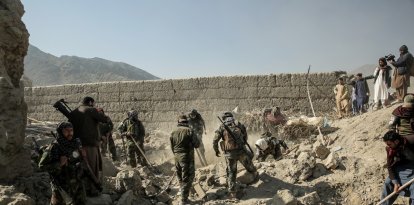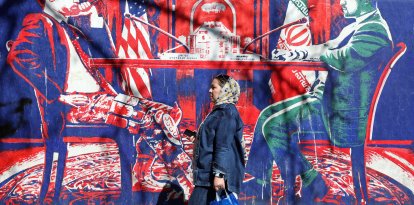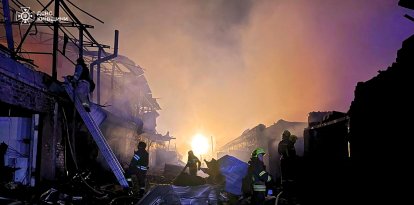Iran 'softens' its stance toward the US and the West after Trump's victory
The Iranian regime fears that the president-elect will impose harsh sanctions, so it decided to suspend an attack against Israel, pressured Hezbollah to advance a ceasefire with the Jewish state and showed willingness to participate in negotiations on its nuclear program, per The New York Times.

Donald Trump and Iran's supreme leader, Ali Khamenei.
Iran plans to "soften" its policies toward the United States and West following the victory of Donald Trump in the presidential election on Nov. 5, according to a report in The New York Times.
The U.S.-based newspaper revealed that Iran called off an attack against Israel following the counteroffensive carried out by the Jewish state late last October.
The Iranian regime even pressured Lebanese terrorist group Hezbollah to try to reach a ceasefire agreement with Israel, which was eventually sealed Tuesday and went into effect a day later.
Trump, an 'unpredictable' leader
The New York Times consulted five Iranian sources familiar with the situation, including a member of the Revolutionary Guard Corps., who pointed out that Tehran considers Trump an unpredictable leader who could re-impose harsh measures against Iran, and this is the reason that led the Islamic regime to evaluate its stances.
It should be recalled that Trump withdrew the United States from the nuclear deal with Iran, imposed tough sanctions against the country and ordered the removal in January 2020 of Qassem Soleimani, commander of the Iranian Quds Force, the division responsible for offshore operations of the Revolutionary Guard Corps.
Crisis in Iran influences sudden Iranian 'pragmatism'
The Iranian energy crisis and the country's struggling economy also influenced the regime's decision to soften its policy, the U.S. media outlet added.
The Iranian regime seeks to avoid an escalation of tensions with the Trump administration
As for the aforementioned suspension of the strike against Israel, the sources noted that the decision was made to avoid an escalation of tensions with the Trump administration, as many of the president-elect's appointees are in favor of implementing tough policies against Iran.
The sources added that the Iranian government is also attracted to Trump's promises to end the war in the Middle East and Ukraine.
Israeli power influenced Iran's possible 'change of course'
As for the pressure exerted by the Iranian government on Hezbollah to accept a ceasefire agreement with Israel, the sources indicated that many Shiite citizens of Lebanon, who regard Iran as their protector, were demanding to reduce tensions due to the heavy blows delivered by the Jewish state in the south of the Lebanese territory.
The New York Times noted that, as a result of this situation, Iranian supreme leader Ali Khamenei sent a message to Hezbollah urging it to advance a ceasefire and end the war, while promising to help rebuild the area and rearm the terrorist group.
It should be noted that Israel eliminated all members of Hezbollah's leadership, including its top leader Hassan Nasrallah, and wounded and killed thousands of its terrorists and severely damaged the group's infrastructure.
'Moderates' vs. radicals
The New York Times further highlighted the growing influence of President Masoud Pezeshkian, considered a moderate compared to other Iranian leaders, who was elected this year on a promise to improve Iran's economy and its ties with the West.
The U.S. newspaper also noted that two Iranian officials described the alleged meeting held between tycoon Elon Musk, a close associate of Trump, and Iran's representative to the U.N. Amir Saeid Irvani, in New York as "promising."
The meeting was harshly criticized by the most radical members of the country's authorities. Some of them even accused Irvani of being a traitor.
It should be noted that Tehran denied that the meeting took place.
The report indicated that while there are voices in Iran that intend to be more pragmatic with the West, there are also sectors that want to continue on the path of confrontation.
Will the negotiations on Iran's nuclear program move forward?
The U.S. newspaper also reported that Iran expressed its willingness to participate in negotiations on its controversial nuclear program with Germany, the United Kingdom and France.
However, Iranian officials have warned that they may reconsider their nuclear policy if new international sanctions are imposed.


























